About Greg Dawes
Greg gained his first graduate degree at the Pontifical Biblical Institute in Rome before returning to New Zealand to complete a PhD in Biblical Studies at the University of Otago. More recently, he completed a second PhD, in philosophy, while continuing to teach in both Religious Studies and Philosophy. Some of his other postings can be found on his blog, at http://gregdawes.posterous.comNullius in verba, Nihil in verbis, Sapere aude
Greg Dawes writes…
I was recently reading Peter Ackroyd’s short biography of Isaac Newton, when I was startled to come across the following sentence: “[The Royal Society] excluded all questions of politics and religion… Their motto became, Nullius in verba, ‘Nothing in words’, or nothing on authority.” As we shall see, “Nothing on authority” is a good rendering of the sense of the motto. But even with my modest knowledge of Latin I could see that Nullius in verba could not possibly be translated as “Nothing in words.” The latter phrase in Latin would be Nihil in verbis, but that was not the phrase chosen by the founders of the Royal Society.
Imagine my surprise, then, to find that “nothing in words” has become what Stephen Jay Gould once called the “canonical mistranslation” of this famous motto. Indeed while casually browsing the shelves of our public library I found another instance. In his popular book on the history of the Royal Society, John Gribbin offers the same combination of mistranslation with accurate paraphrase that appears in Ackroyd’s biography. “Nullius in Verba,” Gribbin writes, “translates literally as ‘nothing in words’ but should be taken as meaning ‘take no man’s word for it.” He’s right that it should be taken to mean “take no man’s word for it.” But he’s wrong to say that it “translates literally as ‘nothing in words.'”
A quick Web sea rch for the Latin phrase will reveal how common a mistranslation this is. You may not be surprised to find such a mistake in popular works. You may be even less surprised to find it on the Web, where (to borrow the words of Tacitus) “all things hideous and shameful from every part of the world find their home and become popular.” But Gould’s criticism was directed at no less a figure than the distinguished philosopher of science, Karl Popper.
rch for the Latin phrase will reveal how common a mistranslation this is. You may not be surprised to find such a mistake in popular works. You may be even less surprised to find it on the Web, where (to borrow the words of Tacitus) “all things hideous and shameful from every part of the world find their home and become popular.” But Gould’s criticism was directed at no less a figure than the distinguished philosopher of science, Karl Popper.
Popper and a fellow author had written to Science regarding the use of the names “progenote” and “protogenote.” The details of this particular “dispute about words” need not detain us. The only fact to note here is that Popper and his fellow author ended their letter by saying,
We all may at times be seduced by the tempting ease of introducing new words. But then, we should always respect the forbidding difficulties facing those who toil to establish new facts. As the founders of the Royal Society of London put it in 1663: Nullius in verba — there is nothing in words. It is facts we seek.
Popper may well be right that disputes about words are particularly fruitless. And it is surely true that scientists seek to know “the facts.” The problem is that the motto of the Royal Society does not make a contrast between facts and “mere words.” Nullius is the genitive singular of nemo, the Latin for “no one.” In verba is a puzzling phrase, for reasons I shall examine in a moment. But it is best understood here as “on the word of.” So the whole phrase can be literally translated as “on the word of no one,” or (as Ackroyd and Gribbin rightly suggest) “take nothing on authority.”
Following Gould’s letter, the issue was discussed by Clive Sutton in the British Journal for the History of Science. Sutton points out that the members of the Royal Society were opposed to the idea that verbal argumentation alone could lead to new knowledge. So the common mistranslation of their motto does, perhaps, capture one aspect of their thinking. But it remains a mistranslation, which fails to express what the motto was intended to convey.
The Latin motto has its origins in a work by the Roman poet Horace. In the first of his Epistles, Horace writes that he is setting aside mere literary concerns in order to turn to philosophy. “In case you ask me who’s my master, what roof protects me,” he writes, “I’m not bound to swear by anyone’s precepts [nullius addictus iurare in verba magistri], I’m carried, a guest, wherever the storm-wind blows me.” It is this passage that explains the slightly odd phrase in verba, which makes more sense as the indirect object of iurare than when taken out of context. But the fellows of the Royal Society could read Latin almost as easily as English. They could assume that their contemporaries would recognize the allusion and read the motto as it was intended.
But how was it intended? In its original context, Horace is presumably not saying that he will take no notice of what the various schools of philosophy teach. What he is saying is that he is not going to consider himself bound to any one of them. He is free to pick and choose whatever opinion he judges best. This lends some support to a thesis recently put forward by Thomas Ahnert, that the motto of the Royal Society reflected its “anti-sectarian aims … rather than its concern with the definition of reliable testimony”. On this view, the motto supports an eclectic attitude, as opposed to dogmatic adherence to a particular school of natural philosophy.
While this anti-sectarian interpretation cannot be excluded, there is evidence that the fellows were advocating reliance on first-hand evidence rather than second-hand reports. Sutton notes that one of the other phrases that was considered (and rejected) was a biblical one, namely omnia probate or “test all things,” originally from 1 Thessalonians 5. This, too, can be understood in the sense of opposing uncritical reliance on authorities. Sutton also cites a remark made by one fellow when the Society met for elections on St Andrew’s Day 1663. Responding to a suggestion that in England St George’s Day would have been more appropriate, the fellow said, “I had rather it [had] been on St. Thomas’s Day, for he would not beleeve till he had seen and putt his fingers into the holes; according to the motto, Nullius in Verba.'”
St Thomas, who is remembered for doubting the reports of Jesus’ resurrection and for believing only when faced with “experimental” evidence, was apparently the patron saint of the Royal Society.
There is, incidentally, a fascinating anticipation of these ideas in a remark made by William Gilbert, some sixty years before the founding of the Royal Society. In the preface to his De magnete, Gilbert asks why he should make his ideas public, given the lamentable state of contemporary natural philosophy. “Why,” he writes, “should I submit … this noble … philosophy to the judgement of men who have taken oath to follow the opinions of others [iuratis in alienorum sententias].” Here, too, there is a contrast between merely following authorities — the attitude Gilbert is condemning — and seeing for oneself.
By way of contrast, Gilbert goes on to describe his intended audience as “true philosophers … who seek knowledge not only in books but in things themselves [non in libris solum sed ex rebus ipsis].” One might be tempted to read this as a contrast between words and facts, of the kind employed by Popper. But what Gilbert is criticizing are those who seek knowledge in books alone (in libris solum). (He presumably wants people to read his book.) As Shapin and Schaffer note in Leviathan and the Air Pump, words had an important role to play in early modern experimental philosophy: they were the means by which experimental results could be conveyed to those who were not among the original witnesses.
 Finally, it might be interesting to note a certain similarity between the motto of the Royal Society and that of my own university, sapere aude. This phrase also came from one of Horace’s Epistles, where it has the sense of “dare to be wise.” (“Who’s started has half finished: dare to be wise! Begin!”) This is the translation favoured by the university authorities. But Horace’s phrase is also cited by Immanuel Kant in his essay Was ist Aufklärung? (“What is Enlightenment?”). In that context he translates it as “have the courage to use your own understanding” (Habe Mut, dich deines eigenen Verstandes zu bedienen). Here, too, a contrast is being made between thinking for yourself and relying on authority. As Kant writes,
Finally, it might be interesting to note a certain similarity between the motto of the Royal Society and that of my own university, sapere aude. This phrase also came from one of Horace’s Epistles, where it has the sense of “dare to be wise.” (“Who’s started has half finished: dare to be wise! Begin!”) This is the translation favoured by the university authorities. But Horace’s phrase is also cited by Immanuel Kant in his essay Was ist Aufklärung? (“What is Enlightenment?”). In that context he translates it as “have the courage to use your own understanding” (Habe Mut, dich deines eigenen Verstandes zu bedienen). Here, too, a contrast is being made between thinking for yourself and relying on authority. As Kant writes,
If I have a book to serve as my understanding, a pastor to serve as my conscience, a physician to determine my diet for me, and so on, I need not exert myself at all. I need not think, if only I can pay: others will readily undertake the irksome work for me.
But if I act in this way, I remain in a state of self-imposed tutelage, which is the very opposite of Enlightenment.
I have yet to convince the university authorities to replace their “Dare to be wise!” with “Have the courage to think for yourself!” This would, however, be closer to what Kant intended. It would also be consistent with the often mistranslated motto of the Royal Society.
Galileo and Experimental Philosophy
Greg Dawes writes…
In a recent conference paper I have argued that in some key respects Galileo’s natural philosophy anticipates the experimental philosophy of the later seventeenth century. I am not claiming that Galileo uses the term “experimental philosophy.” Nor do I claim that he makes any distinction comparable to that between experimental and speculative natural philosophy. His Italian followers in the Accademia del Cimento would later do so, but he does not. Nonetheless, the way in which Galileo undertakes natural philosophy displays at least two of the features that Peter Anstey and his collaborators have argued are characteristic of experimental philosophy.

Galileo's sketch of a device to demonstrate the power of a vacuum.
The first of these has to do with the role of experiment. Much of the twentieth-century debate centred on whether Galileo actually performed the experiments about which he writes. But the more important question has to do with the role of experiments in Galileo’s thought. Like his Aristotelian predecessors, Galileo seeks to construct a demonstrative natural philosophy: one in which the conclusions follow with certainty from the premises. But unlike the Aristotelian, he relies on geometrical proofs. Like any mathematical proofs, these can be elaborated in an a priori fashion, without any reference to experience. But whether a particular proof applies to the world of experience – or, better still, whether it accurately describes the structure of the world – can only be ascertained experimentally. It is experiment which tells us which geometrical proof is to be used, even if the geometrical proof itself can be developed independently of experience. (I am relying here on the work of Martha Féher, Peter Machamer, and others.)
Perhaps more importantly, Stephen Gaukroger has argued that experimentation shaped the very way in which Galileo’s physical theories are framed and formulated. Alexander Koyré and others have argued that the laws of Galilean physics are “abstract” laws which refer to an ideal reality. It is true, of course, that in setting aside “impediments” (impedimenti), such as the resistance of the air, Galileo’s proofs do not refer to the world of everyday experience. But it is unhelpful to think of them as an idealisations of, or abstractions from, experienced reality. There is an experienced reality to which they conform. It may not be that of everyday experience, but it is that of carefully controlled physical experiments. It follows that in Galileo’s work, the task of natural philosophy is being rethought. It is no longer the study of reality as revealed to everyday observation; it is the study of that reality revealed in experimental situations.
The second way in which Galileo’s natural philosophy anticipates the later experimental philosophy is in its comparative lack of interest in the mechanisms thought to underlie phenomena. It is not that Galileo was a positivist in our modern sense. There are passages in which he engages in speculation regarding matter theory and on these occasions he favours a corpuscularian view. But such speculations are, as Salviati says in the Two New Sciences, a mere “digression.” Galileo does not consider that his new science requires them. Indeed his work on motion is almost entirely a kinematics – as he freely admits, it says nothing about the causes of motion – but Galileo does not consider it any less significant as a result.

Galileo's solution of the "rota Aristotelis" paradox, demonstrating that a body could be composed of an infinite number of unquantifiable atoms.
This should not be interpreted as a general lack of interest in causation, as Stillman Drake suggests. Galileo shares the ancient desire cognoscere rerum causas (to know the causes of things). But the causal properties Galileo seeks are different from those sought by his predecessors. His causes are the mathematically describable properties of the objects whose behaviour is being explained, properties that no Aristotelian would regard as essential. (Even his atoms are more akin to mathematical points than physical objects.) It is, once again, experimentation that allows us to pick up which of those mathematically describable properties are generally operative and therefore the proper subject of a science. It is this move that allows Galileo, as it would later allow Newton, to be content with a causal account that remains on the level of phenomena, rather than speculating about a realm inaccessible to observation.
In an early dialogue, Galileo has two rustics (contadini) speculating about the new star of 1605. One of them advises his companion to listen to the mathematicians rather than the philosophers, for they can measure the sky the way he himself can measure a field. It doesn’t matter of what material the heavens are made. “If the sky were made of polenta,” he says, “couldn’t they still see it alright?” This is surely something new in the history of natural philosophy.
Postscript:
While I would still defend the individual claims contained here, my continued study of Galileo has made me increasingly cautious about the usefulness of a distinction between experimental and speculative natural philosophy. It is certainly the case that many late seventeenth-century thinkers made such a distinction, but is it a useful one for us to make? I’m not confident that it is.
Experiment certainly played an important role in Galileo’s work, although precisely what that role was continues to be contested. And it is true that Galileo has little interest in speculating about the underlying structure of the world: even if, as he writes, the sky were made of polenta, the mathematicians could still measure it. The problem is that the classical, mathematical tradition out of which he comes — that of astronomy, statics, optics, and (after Galileo) the study of local motion — cannot be helpfully characterized as either experimental or speculative. It certainly uses experiment, but it also reasons a priori, in ways that seem independent of experience.
So perhaps it would be better to have a threefold classification of early modern scientific traditions. (A classification of this kind is suggested by Casper Hakfoort in the last chapter of his Optics in the Age of Euler.) A first tradition would be that of matter theory, which is inevitably speculative insofar as it deals with matters not accessible to direct observation. (This is the realm of Newton’s “hypotheses.”) Corpuscularian proposals would fall into this category, as would Descartes’s vortex theory. A second tradition would be that of experimental natural philosophy, which regarded the results of experiment as themselves significant forms of knowledge, whether or not they could be connected with an underlying theory of the nature of matter. Finally, there is the mathematical tradition that Galileo transformed, so successfully, by producing a mathematical account of local motion.
Individual natural philosophers could engage in all three kinds of activities, but will differ according to the emphasis they place on one or other of them. So although Galileo certainly engaged in experiments, his emphasis was on the kind of reasoning characteristic of the mathematical tradition. It is this form of reasoning, I have come to believe, that cannot be easily fitted into the experimental-speculative scheme.

